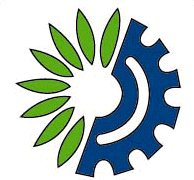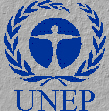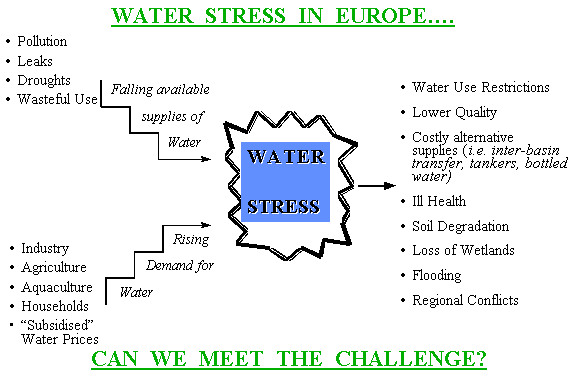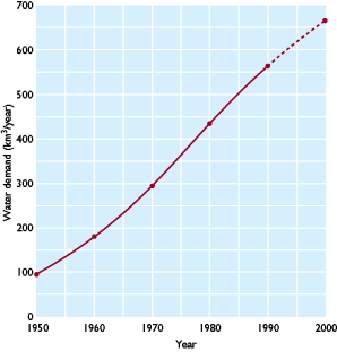 |
United Nations
Environment Programme
and
European Environment Agency |
 |
For use by the media only, not an
official document
PRESS RELEASE
Water Stress in Europe
Geneva/Copenhagen, 20 January 1997 -- The European
Environment Agency (EEA) and the UN Environment Programme (UNEP) are
launching today their first annual joint Statement on the Environment,
this year focusing on water resources under serious stress in
Europe.
Water stress - shortages, floods, pollution and damaged ecosystems
(see graphic) - requires radical new
approaches to the use and management of water resources if Europeans
are to avoid severe water crises, the joint Statement concludes.
"We have a 19th century approach to 21st century problems", says
Domingo Jiménez Beltrán, EEA's Executive Director. "We just think of
supplying new dams and pipelines ("megalitres") rather than increasing
water use efficiency ("negalitres"). Prices don't cover the full cost
of supplying and using water, which encourages its inefficient use. An
integrated approach to water quality and quantity is needed."
Some of the main points in the Statement include:
- The low availability of water demanded for households, agriculture,
and industry.
- Drinking-water losses from pipes are estimated at 30% in most
countries and up to 70-80% in some cities.
- As water shortages increase, river basin authorities are
restricting water-use for industry. Similar pressures on agriculture
are likely to occur in the near future.
- About 60% of large European cities are over-exploiting their
groundwater resources for their drinking and other water needs. If
depleted or polluted, these resources are expensive and time-consuming
to restore.
- Other threats include the increase of the global mean sea level due
to changes in climate and run-off patterns of water courses in some
areas.
"Concerted action at the European level is becoming more and more
essential," says Frits Schlingemann, UNEP's Representative and Regional
Director for Europe. "International organizations provide a forum for
promoting and complementing national action through international
cooperation. Detailed and reliable information as well as analyses of
the world's fresh water systems can help promote solutions for easing
related environmental pressures."
The Statement summarises many water initiatives, such as the
proposed European Union Water Resources Framework Directive, the
Cleaner Production Programme of UNEP, and the improved pollution
monitoring work of the EEA. It stresses that new political agreements
on integrated river basin management and greater public support for new
types of policy instruments such as taxes, voluntary agreements and
tradable permits are needed if these initiatives are to be implemented
successfully.
For more information, please contact Gertrud Attar at telephone
(4122) 929 9234, fax (4122) 797 3464 or e-mail: attarg@unep.ch
or Niels Thyssen at the EEA in Copenhagen, telephone (4533) 367 156,
fax (4533) 367 151 or e-mail: niels.thyssen@eea.dk.
Further notes:
- The EEA provides objective, reliable and comparable information on
Europe's environment for those concerned with framing and implementing
European and national environmental policy, and for the public. UNEP is
the environmental conscience of the United Nations system, having a
mandate to provide leadership and to encourage partnerships in caring
for the environment, with a strong regional emphasis.
- Negalitres refer to demand side management (DSM) which focuses on
the more efficient use of water by reducing losses, less wasteful use
of water, more efficient appliances, and water recycling. In many cases
it is cheaper and more effective to improve water use efficiency than
it is to increase water supplies. For example, water efficiency
measures reduced the consumption of water in Madrid by 25 per cent
between 1992 and 1994. This is the equivalent to a reservoir providing
over 100 million m3 of water per year. The use of 6-litre toilet water
flushes in the UK, rather than the usual 9 litres, would save 10 per
cent of the UK's household water use, according to a recent
estimate.
- Inefficient use: The prices of nitrates and pesticides on
agricultural land do not include the full costs of their use, such as
their pollution of groundwater and the expense of treating these
drinking water supplies so as to meet EU water quality standards.
- Water quality and quantity are linked. For example, polluted water
can reduce available supplies; and channelisation of rivers can improve
drainage in adjacent farmland, but it also destroys aquatic life in the
river, reducing its pollution-filtering activity, and the risk of
downstream flooding is increased by the speeding up of water
flow.

European water demand, 19502000

Source: WHO/UNEP, 1989





Document Actions
Share with others